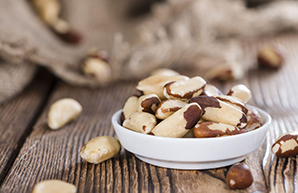Whether you have an underactive thyroid (hypothyroidism) or overactive thyroid (hyperthyroidism), what you eat can play a big role in how your thyroid functions. “Many nutritional factors play a role in optimising thyroid function,” explains Cheryl Meyer, a registered dietician and nutrition consultant. “Both nutrient deficiencies and excesses can worsen thyroid function and symptoms.”
The following are important nutrients to take note of if you suffer from a thyroid condition:
Iodine
Iodine is an important nutrient for the healthy functioning of your thyroid. Abby Courtenay, a registered dietitian, explains that iodine is an essential element, meaning that the body does not produce it and it needs to be absorbed through diet. “Salt containing iodine is the most common source these days, but it can also be found in fish, dairy, eggs, seaweed, shellfish and grains,” she says.
Vitamin D
A vitamin D deficiency is linked with serious thyroid conditions such as Hashimoto's and Grave’s diseases.
An overactive thyroid, or hyperthyroidism is known to cause bone loss, says Meyer, stressing the importance of bone-building nutrients such as vitamin D. Foods containing vitamin D include fatty fish, milk, dairy, eggs and mushrooms. Last but not least is sunlight, another important source of the vitamin.
Selenium
Selenium is a fundamental component of thyroid function. Both selenium deficiency and excessive intake have been shown to be detrimental. Foods that contain selenium include Brazil nuts and tuna, which should be increased or decreased depending on your levels.
Vitamin B12
A vitamin B12 deficiency can affect the body’s response to prescribed hormone replacement, and can worsen an underactive thyroid (hypothyroidism). Unfortunately B12 deficiencies are often difficult to diagnose, and commonly go unnoticed. Food sources of vitamin B12 include sardines, salmon, liver, dairy, fortified cereal, nutritional yeast and marmite.
Goitrogens
“Goitrogens are substances found in some foods, drugs and chemicals that interfere with the uptake of iodine in the thyroid and can exacerbate iodine deficiency, which can eventually lead to goitre (an enlarged thyroid gland),” explains Courtenay. “Being deficient in iron and/or vitamin A may also be goitrogenic.”
Foods high in goitrogens include soy, cassava and cruciferous vegetables such as cabbage, broccoli, cauliflower and kale. “Goitrogens consumed in reasonable amounts in a varied diet are unproblematic,” says Courtenay, “but you may find yourself unknowingly consuming unreasonable amounts when the above foods are juiced or made into a smoothie and consumed in large quantities in a restricted and unvaried diet.”
Get professional help before you change your diet
With many of the above nutrients, deficiency and excess both have significant risks. Meyer recommends getting your vitamin levels tested for a proper diagnosis before making any changes to your diet, and to approach supplementation with great care and under the advisement of a medical professional, such as your Clicks pharmacist.
Shop online at Clicks.co.za for your supplements
Looking for affordable, tried-and-trusted vitamins and supplements? Consider the convenience of online shopping to stock up on vitamin D, vitamin B12 and other vitamins and supplements.
IMAGE CREDIT: 123rf.com

